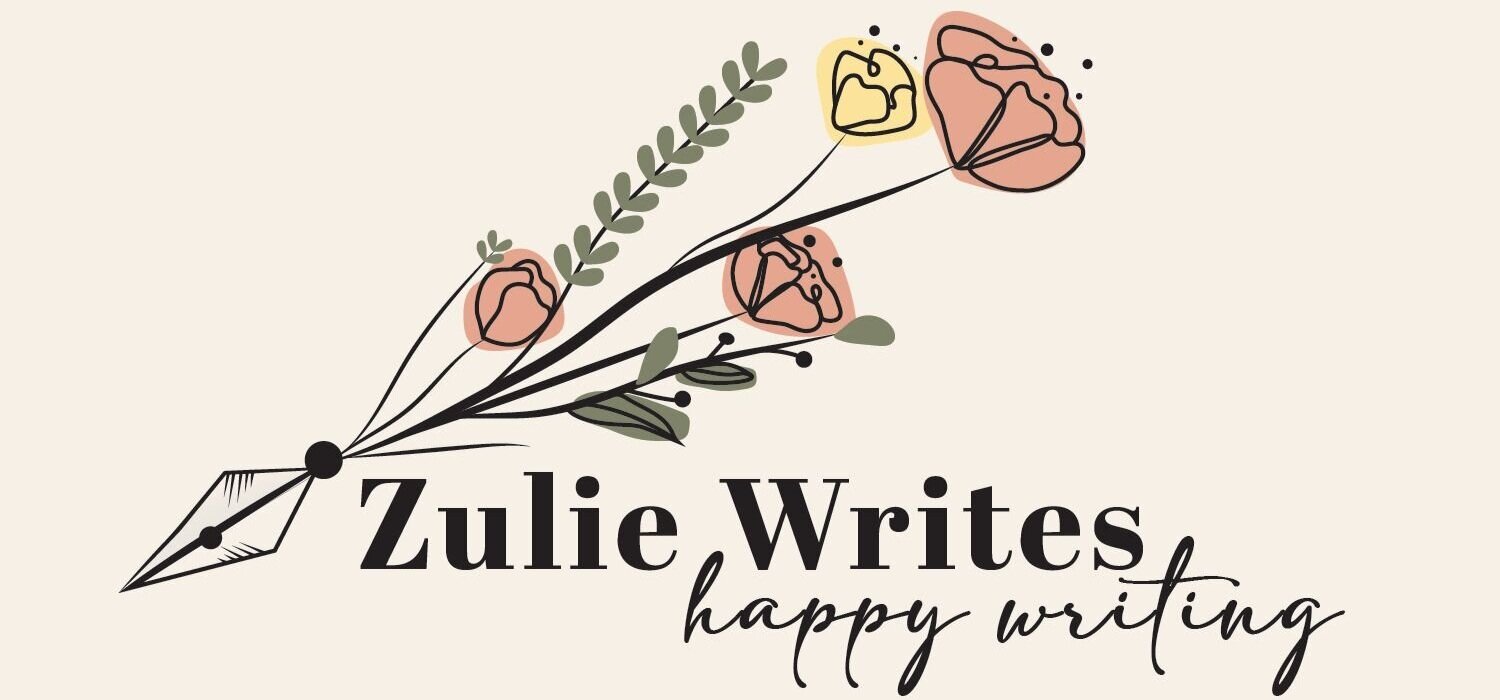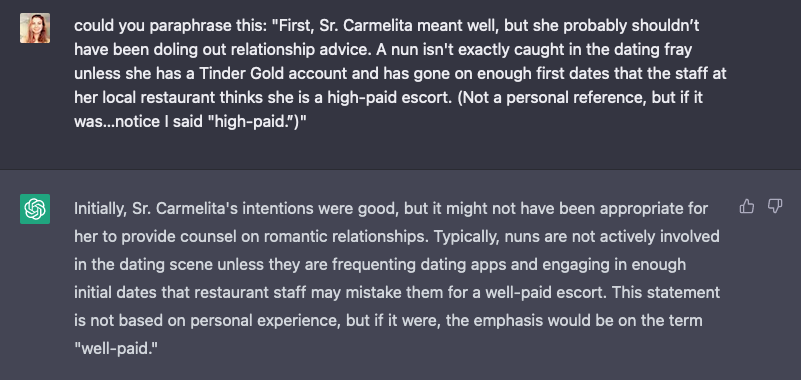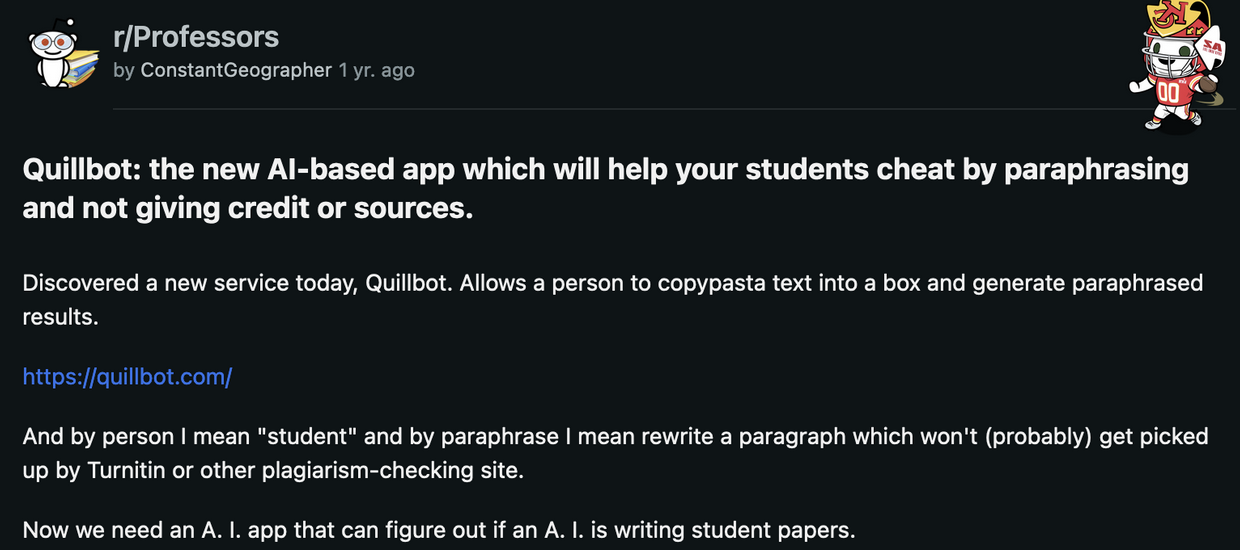Quillbot Review: The Best Paraphrasing Tool for Writers?
No, lol. If you’re wondering if Quillbot is useful for writers, you can bounce off this page right now. My honest Quillbot review is that it’s worse than useless to make your content better.
Quillbot is a paraphrasing tool for writing content. It promises to “enhance your writing.” Allegedly, it’s for students and professionals to help ensure their words meet the right tone.
This example really illustrates what I mean.
It’s got a freemium model, where you can access two rewriting modes for free, or pay to access five additional modes. You can also adjust the synonym frequency, choosing to remain closer to the original content or go further.
It’s yet another AI tool in a crop of new AI tools. It can help your grammar, reword your sentences, summarize main ideas, and check for plagiarism.
With Quillbot, ultimately, every feature is there to help you improve your writing. Or is it?
My experience with Quillbot
I thought I’d only used Quillbot AI for the first time when I was ready to review Quillbot for this article. Unfortunately, I’d crossed paths with it before, without ever knowing it.
OK, Quillbot anecdote time. I was recently browsing the web, researching if Upwork is legit. I came across a funky article, which I won’t link to here. It explained what Upwork was, but in strange, stilted phrasing. I couldn’t understand why, instead of saying, “Upwork is a freelance gig platform,” the writer had chosen to say, “A platform for freelancing is Upwork.” The whole article was like that.
This wasn’t the first time I’d read weirdly structured phrases. But this time,I hunted deeper. Shortly afterwards, I found another article that was eerily similar.
In the first article I found, Article A, the author said, “Despite being a trustworthy site, Upwork might not be the greatest choice for novices.” In Article B, the author wrote, “Upwork is a legitimate platform, but it may not be the best option for beginners.”
It was like someone had copied it over, paragraph by paragraph, but with a thesaurus in hand.
I checked the dates and confirmed what had happened. Someone had written Article B last year. Then someone else had copy-pasted most of it into a paraphrase tool – possibly Quillbot, possibly a Quillbot alternative – and reposted it onto their own website. This method is smart, if morally bankrupt. It evades plagiarism detections, ranked well on Google, and probably sent a ton of ad revenue to Article A’s author.
This filled me with rage and despondency. I think the ad-based creator economy is doomed to fill my search results with articles that rank, but don’t actually answer my question. The game is rigged by whoever plays by the algorithm’s rules, not by quality writing and valuable answers. And Quillbot, to me, is part of the problem.
So my Quillbot review will be scathing, because I genuinely can’t think of any legitimate reasons someone would need to pay $9 a month for this tool unless they were trying to skip out on plagiarism detectors and rip content to rank faster and without doing the work themselves.
How does Quillbot work?
Quillbot basically works like a glorified thesaurus powered by Grammarly. You can see an example of what I mean here:
Another example of Quillbot’s paraphraser.
Let’s look into how Quillbot works with more depth. At its core, Quillbot is a language generation tool. It uses a technique called natural language processing (NLP) to eat text and spit the content back out differently according to user inputs and how it’s weighted words by importance. It can paraphrase, or reword things. It can summarize. It can also simplify text.
It’s AI-powered, but it’s careful to say it’s not AI writing. (On a side note, I found it unbearably annoying that Quillbot is trying to rake in the caché of “AI” by including it on its product’s name, but while still trying to steer clear of drama and controversy. You can’t have it both ways, Quillbot!)
How does Quillbot’s paraphrasing feature work?
I wanted to dig into Quillbot’s flagship product a bit, to better understand what the main selling point of Quillbot is. The process goes like this:
You, the user, input text into Quillbot’s paraphraser.
The text is preprocessed, which means it takes out punctuation, special characters, and stop words like “the,” “is,” and “of.”
Quillbot converts that text into numerical representation, because machines are much better at reading numbers than words. This helps Quillbot’s NLP model understand which words are commonly used together, and which words should go where.
Rewording magic happens. Quillbot uses synonym replacement, sentence reordering, and semantic rephrasing.
For example, “The cat sat on the mat” becomes, “The feline perched on the rug” with synonym replacement, while it becomes, “On the mat, there was a seated cat” with semantic rephrasing.
Quillbot then uses a transformer-based language model (what GPT-4 uses) to generate text that makes sense and is readable.
Content optimization and fine-tuning time. Quillbot makes sure it's is grammatically correct and is relevant to the user’s use case.
That’s all a fancy way of saying it’s a Grammarly-powered thesaurus.
I also want to point out that I don’t think Quillbot itself is clear on what its paraphrasing mode does. It has a whole article about the definition, but when I use its exact sample text in its tool, I get something completely different.
Quillbot’s example of “paraphrasing.”
Quillbot’s actual paraphrasing results on that exact same text.
Now, when I try that text with Quillbot’s shortening feature, I get something more similar to what it promised. But that’s shortening, not a paraphrase.
Example of the Summarizer tool.
When I used Quillbot’s tool, I found its definition of “to paraphrase” seems to simply mean to spin a roulette wheel on synonyms and choose one at random.
Quillbot features
Quillbot offers six main features:
A paraphrasing tool, which I covered above.
A summarizer, which can shorten and simplify text.
Co-writer, which as far as I can tell is like a Google doc with Grammarly, a notes section, and a built-in reworder.
A plagiarism checker, to help avoid “unintentional” plagiarism. Allegedly.
A word counter.
A translator.
A citation generator
Google Translate, Google Docs or Microsoft Word, and Grammarly cover the bottom four functionalities, so I’m going to focus on Quillbot’s USPs for this section: the paraphraser and the summarizer.
The paraphraser
I’ve already gone into a lot of depth on the paraphraser, since it’s Quillbot’s Number One product, so I’ll keep this section short.
The paraphraser helps you rewrite content to make the text unique. It also says it makes it easier to understand, but I’m less sure of that.
The summarizer
The summarizer seems to work better, since it can strip out a lot of text and get to the meaning of the content. You can see an example above. But I found it noticably underpromoted on the site. Clearly, most people don’t come to Quillbot to use the Summarizer.
I also found it sometimes summarized too much, losing too much of the original meaning.
Pros and cons of Quillbot
I haven’t exactly been subtle on my feelings toward Quillbot, but I will do my best to give them a fair shake here in the pros and cons section.
Pros of Quillbot
Great to plagiarize undetected
Decent summarizer
Decent paraphraser, on occasion
Want to plagiarize? Quillbot helps you do it for free, 125 words at a time. Upgrade to Premium and suddenly you’re looking at unlimited amounts of rewordable text.
OK, saltiness over. The real benefits are the summarizer, which was powerful. I did find that occasionally, Quillbot did sometimes take my wordier, clunkier sentences and paraphrased them in a helpful, beneficial way.
Cons of Quillbot
The paraphrasing tool was not great
It strips your text of its voice
The paraphrasing tool most often didn’t improve my writing, I humbly believe. See below.
I also tested it on a few of my favorite authors and I noticed something odd. I can’t say, objectively, if Quillbot made their writing better or worse. I think it was worse. But regardless of quality, the paraphrased version was indisputably less in their voice.
Screenshot of Carlyn Beccia’s Medium story put into the paraphraser. It’s not great.
Turns out when you take out the main words an author chose for their sentence, you take out their voice. It was almost surgical in its precision.
Quillbot seems to understand this, in an ironic twist. “Your words matter, and our paraphrasing tool is designed to ensure you use the right ones,” Quillbot’s marketing team writes on their homepage. What a shame they don’t understand what that really means.
Quillbot alternatives
I found a few alternatives to Quillbot during my research. Here they are, in reverse order of my preference:
1. Quillbot vs Spinbot
I don’t know if I can fairly say whether Spinbot is a Quillbot competitor, because something weird happened when I tried to test it out: I was redirected to Quillbot.
As I click the “advanced paraphrase” button, Spinbot takes me to Quillbot, its alleged competitor! I smell an affiliate deal.
Also, I found Spinbot shoddy. Honestly, Quillbot was better than Spinbot. Spinbot bloated the text by about 20%, and the resulting reworded content was clunky.
2. Quillbot vs ChatGPT
I have mixed feelings about ChatGPT, but at least it’s not pretending to be something it’s not. It’s an AI text generator, plain and simple. When I asked it to paraphrase the same text I tested Quillbot and Spinbot on above, here’s what I got:
It’s fine. Not amazing, but workable.
I would rank ChatGPT as better, because I think it kept the meaning of the text more, and it’s also free to use for now.
3. Just write the dang article yourself
This was, spoiler, the same conclusion I came to when testing the best AI text generation tools, or looking at the best ways to fool AI content detectors. Quillbot, Spinbot, and ChatGPT all have one thing in common: they’re language models. By being a human being, with opinions, experiences, thoughts, and biases, you’re a better writer already.
Other options:
In other reviews, people compared Quillbot to Jasper.ai or Spin Rewriter for an article rewriter option. Check them out - I've already unfavorably reviewed Jasper.ai in my AI tool review, and Spin Rewriters seems pretty clearly like another plagiarist tool.
Other artificial intelligence tools will probably accomplish the same thing, for varying prices.
Quillbot pricing and plans
How much does Quillbot cost? What features do you get?
Well, the free plan is free. Naturally. You get access to two writing modes, the Standard mode which “[r]ewrites text in a reliable manner to maintain meaning.” You can also access the Fluency mode, which “[e]nsures text is readable and free of errors.” (No, I don’t know why the Standard mode doesn’t also ensure text is readable and free of errors like grammar mistakes.)
You can paraphrase 125 words at a time. You can unleash Quillbot to use more synonyms.
What about a Quillbot premium review? Well, I didn't want to give them my $19.95 even with a 3-day refund policy, so this is all from their website.
With a paid plan, you’re looking at spending between $8.33 to $20 a month, depending on if you pay monthly, semi-annually, or annually. This gets you access to a slew of features:
Seven writing modes, including the first two modes and also Formal mode, Simple mode, Creative mode, Expand mode, and Shorten mode.
The option to add even more synonyms.
A plagiarism detector.
A grammar checker.
Faster processing time.
The ability to scan the results of all seven modes at once, I guess so you can choose the best option.
Freeze words (when you're writing industry-specific content, and don't want it to paraphrase a specific keyword).
Unlimited words.
6000 words in the Summarizer, versus 1200 in the free plan.
So ask yourself: are those features worth between $8-$20 a month to you? (When ChatGPT can do most of them for free, by the way?)
For me, no.
Ask yourself: what are the benefits of this AI writing tool?
Final ranty bit before I conclude and let you go. Why does Quillbot exist, if not to help people cheat and plagiarize? I can’t think of any reasons. I did not find it to “improve” my writing, and none of the features were standout or unique. I mean, a grammar checker? MS Word or Grammarly do that with no issue.
What’s the benefit of rewording stuff? How on earth does that help you improve your writing? This goes for academics and students alike.
I found it incredibly damning that the FAQs most searched for in conjunction with Quillbot are about plagiarism. I mean:
Well? IS Quillbot cheating?
These FAQs are from students who are using Quillbot to, I guess, copy text from each other? Or from papers? I can’t tell.
There is a citation generator, but I guess not enough people are using it.
Professors are also displeased with Quillbot. This was the top result on a quick Reddit search for Quillbot:
Screenshot of a professor complaining that her students are using Quillbot to cheat and evade plagiarism detectors.
So clearly that citation generator is being ignored in favor of just copying text and rewriting it.
Why do you disagree with all those positive Quillbot reviews?
OK, we all have different opinions on things and that's fine. But some of those Quillbot reviews aren't as trustworthy as you may like.
First, those who did write a Quillbot plagiarism checker review or who wrote Quillbot paraphrasing tool reviews were usually dishonest students praising Quillbot for making it easy to evade Turnitin's detector.
I also found that many premium reviews were affiliate links. Not terrible, but it's hard to trust someone who says, “Quillbot is worth every penny you spend on its premium plan,” when you know that person is getting a financial kickback for writing that.
Feel free to check out other, more positive Quillbot reviews. Just make sure to read those Quillbot reviews very carefully, and double-check whether the author gets money if you buy Quillbot premium using their link.
Should you use Quillbot?
Maybe I’m being hopelessly naive, but I really hope, after reading my review of Quillbot, you don’t want to use it. I hope you are encouraged to write your own content, paraphrase on your own (an activity which WILL actually improve your writing!).
And honestly, even if I were a plagiarizer, or if I wanted to paraphrase content to evade plagiarism detection, I’d probably use ChatGPT since it’s free and easier for me to use. And it also comes with a grammar checker.
I cannot think of a single good use case for Quillbot. Disagree? Please let me know - I’m definitely only human. I’d love to hear if you have any good, honest ways that Quillbot helps you in your writing.









